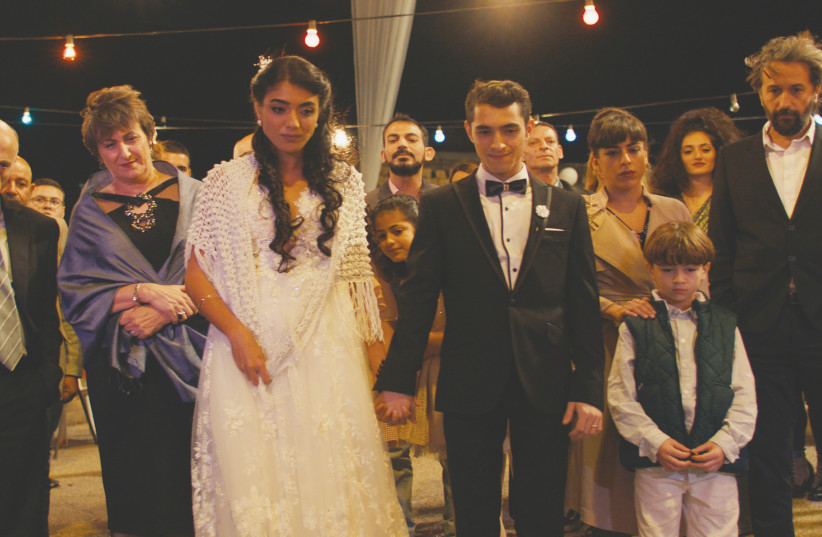NEW YORK – It’s called the Other Israel Film Festival for a reason. The annual event at the Marlene Meyerson Jewish Community Center in Manhattan presents films that explore Israel’s minority populations, examining the relationships between history, culture and identity.
This year’s opening night headliner is Let It Be Morning (Vayehi Boker in Hebrew), which won the 2021 Ophir Award – Israel’s version of the Academy Awards – for best film and a host of other categories. The Other Israel Film Festival will serve as Let It Be Morning’s American debut.
The film, adapted from a 2006 novel by Palestinian author Sayed Kashua, follows Sami, a middle-class Arab businessman based in Jerusalem, who has returned to his remote home village in Israel for his younger brother’s wedding. Unimpressed with his former life and his family that remained in the village, Sami is eager to get back home, until the Israeli army suddenly places the village on lockdown to search for Palestinians from the West Bank there illegally in order to build Sami’s family second home.
While the festival, running this year from November 4-11, caters in large part to an American Jewish audience, Let It Be Morning’s nerve center is not the Israeli-Palestinian conflict that eats up much of the oxygen in conversations among American Jewry concerning Israel. Instead, it explores a topic much less in the consciousness of American Jewry at-large when it comes to Israel. It’s the issue of identity within Israel’s sizable Arab population. Are they Israeli? Are they Palestinian? Are they in between?
Even the film itself, celebrated in Israel, was boycotted by its Palestinian cast at the Cannes Film Festival because it was entered into the competition as an Israeli movie alone, as required by its acceptance of funding from the Israeli Film Fund, and not as a joint Israeli-Palestinian production.

“I never thought that films have identities. I think people have identities. And as far as I’m concerned, anyone can define his own identity the way he feels. In a fairy tale way, the film asks a bigger question about how people tend to define themselves by closing off other people. And I hope that you don’t have to close off other people in order to define your own identity,” Eran Kolirin, Let It Be Morning’s director, told The Jerusalem Post ahead of the American premiere.
“I did this film with a really brilliant cast of the brightest and most beautiful people I’ve ever worked with. Some of them are Palestinians, some of them are Jews, some of them are Muslim. The film is the culmination of all of that. It is the sum total of who we are and our hearts which we put in the film. The other question is in the eye of the viewer. This concept of films having an identity, it’s rather odd, you know, because only people can have one,” said Kolirin.
THE DIRECTOR said he is eager to see how an American Jewish audience will react to the concepts explored in his film.
The Other Israel Film Festival, by definition, has long presented minority perspectives as alternatives to more mainstream Jewish Israeli-focused films. Kolirin, though, says that’s a concept that doesn’t apply anymore.
“The Israeli Jewish point of view in films is not really existent. It’s a concept which is completely imaginary now, because this society is composed of Palestinians, ultra-Orthodox, Orthodox nationalists, Ashkenazi middle bourgeois class and Mizrahi lower class. The story of this one identity – first of all, I’m pretty glad that it’s over because when you have to define this mainstream identity, you usually do that by excluding other people. Society is not one face and the questions are more complex. It’s natural in the same way that the American film perspective has changed. Maybe in the ’50s, what was an American film was very obvious. Nowadays, not so much. Thank G-d, things have evolved,” said Korilin.
So, too, have the festival’s patrons, according to Isaac Zablocki, the Director of Film Programs at JCC Manhattan.
“This type of film was the impetus for starting this program 15 years ago. And for 15 years now, thousands at our festival have gained a more nuanced understanding of Arabs in Israel. We are no longer teaching them the 101 course,” Zablocki told The Jerusalem Post.
“For most of the festival’s history, we featured films that delved into Bedouin, Druze and Arabs in Israel who want to be Israeli citizens. For years at least the last five years, though, we have been incorporating films involving Palestinians in the West Bank (Judea & Samaria). This film is a perfect example of why. Israeli Arabs can’t disconnect from the West Bank completely. To not show the West Bank in our festival would show a lack of understanding of Palestinian identity,” Zablocki said.
Most of The Other Israel Film Festival’s film screenings and panel discussions will be available both in-person and virtually. Let It Be Morning will only be shown at the Marlene Meyerson JCC Manhattan. The film 200 Meters, shot in the Arab Samarian city of Tulkarm, will be the closing night feature. It was the Jordanian entry for the Best International Feature Film at this year’s Academy Awards.
